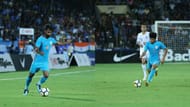India played their final group game of the Intercontinental Cup against New Zealand at the Mumbai Football Arena on June 7. With one foot already in the finals, the Blue Tigers experimented a lot with the squad against the All Whites.
Players like Amrinder Singh, Salam Ranjan Singh, Narayan Das, Rowlin Borges, Md. Rafique and Balwant Singh all made starts while regular starters like Gurpreet Singh Sandhu, Anas, Sandesh Jhingan, Udanta Singh and Jeje sat on the bench.
It was the visitors who started strongly, controlling the game right from the word go. New Zealand put in crosses from both the flanks and ensured that the Indian defenders had constant trouble dealing with aerial balls.
India took the lead against the run of play in the 47th minute when Sunil Chhetri was rewarded with a deflected goal.
However, India’s lead was short-lived as New Zealand equalized almost immediately in the 48th minute through De Jong. The All Whites struck again and sealed the game in the 84th minute when Moses Dyer scored from a Sarpreet Singh pass.
The match ended 2-1 in favour of New Zealand, who grab the top position in the group with this win. Even though India have 6 points and a better goal difference, they stand 2nd due to this head-to-head result.
We take a look at 3 things that went wrong for India in this encounter:
#3 Unstable Defense

India lined up with Pritam Kotal, Salam Ranjan Singh, Subhasis Bose, and Narayan Das in defense, with Amrinder Singh manning the posts. It was evident from the very beginning that there was a huge communication gap between the defenders, leading to open spaces - which the New Zealand players made good use of.
One one hand, Amrinder was not at his best and fumbled crosses. He also looked a bit hesitant while coming out to clear balls. On the other hand, Subhasis and Salam clearly didn’t have any sort of communication going and India conceded the first goal with both the defender's ball watching while trying to mark the same man.
The build-up play from the back was ineffective, and most of the long balls that the defenders played went astray.
#2 Midfielders performing the vanishing act to perfection

Rowlin Borges, Md. Rafique and Anirudh Thapa were completely overrun by the New Zealand midfielders. There seemed to be no proper planning in the midfield, as most of the attacks happened with aimless long balls being played to the strikers.
Playing Rafique on the right wing was another blunder that Stephen committed, and he even tried to rectify it with an early substitution, but that also didn’t work in India’s favour. The distribution of the midfielders was poor and at times they made schoolboy errors, gifting possession to the All Whites.
The will to win back possession or second balls seemed to be lacking, as huge gaps appeared between the midfielders and the defenders, which the All Whites attackers took full advantage of. The midfield, in general, seemed to have no answer to Sarpreet Singh, as the Indian origin New Zealand midfielder who bossed around in the middle of the park, creating numerous chances for the Fritz Schmid side.
Halicharan Narzary, who came on as a second-half substitute had a poor game, as he committed some silly fouls and could not capitalize on numerous crossing opportunities.
#1 Not Starting Jeje and Udanta

Jeje played his 50th international game for India, but it wasn’t a memorable one as he failed to make an impact after coming on in the second half. Meanwhile, Udanta, who came on early in the first half was not at his best and had a quiet game as India kept playing aimless long balls to the strikers.
Jeje is vital to India’s long ball strategy as he can hold up play, bringing in the wingers and Chhetri into play. Balwant was also often seen stranded alone in the flanks, which forced him to play long balls.
India tried to rectify their mistakes later in the second half, but till then the All Whites were prepared and had all the answers to whatever little India produced in the attacking third. Udanta was seldom given space to run into, and Jeje and Chhetri were marked closely.
